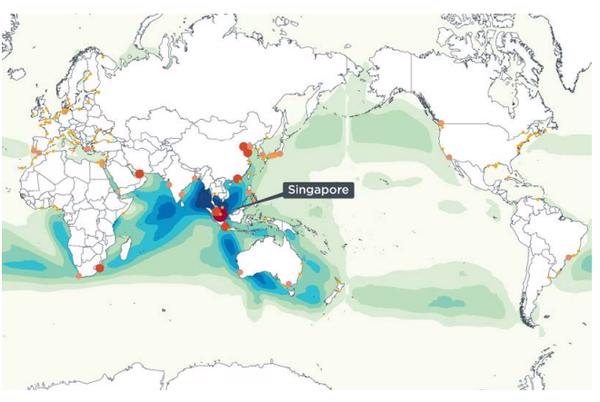Singapore has highest per capita deaths due to shipping emissions – ICCT
Nearly 8 in 100,000 people die in Singapore due to shipping emissions, about 10 times the global average, according to a new report.
 PHOTO: ICCT findings suggest Singapore accounts for the highest shipping emissions in Southeast Asia's seas. ICCT
PHOTO: ICCT findings suggest Singapore accounts for the highest shipping emissions in Southeast Asia's seas. ICCT
Marine fuel sold in Singapore is the cause behind more than 42% of all shipping emissions in the seas surrounding Southeast Asia, according to a whitepaper released by environmental NGO International Council on Clean Transportation (ICCT).
ICCT says there is an immediate need for Singapore to switch to renewable marine fuel to control its high mortality rate of 8 per 100,000 people. It is followed by Denmark and the Netherlands (5.3-5.5 per 100,000 people) on the list.
However, the study points out that renewable marine fuels tend to have lower energy density, forcing shipowners to bunker often. This could lead them to diversify their bunker procurement and possibly risk Singapore’s dominance in global marine fuel market.
This could create new bunker hubs for renewable marine fuels in countries like China, Malaysia, Indonesia and Australia.
Apart from air pollution, Singapore’s marine fuel sales contribute to at least 40% of all scrubber washwater discharges in Exclusive Economic Zones (EEZs). The most heavily impacted countries in these zones have been Vietnam, Malaysia, Sri Lanka, China and Singapore itself, ICCT says.
In order to remain a top bunkering hub, ICCT argus that Singapore should ramp up investments in renewable marine fuels and halt further investments in conventional bunker fuel infrastructure, through measures such as not registering any new bunker barges.
It calls for not only investments in oil-based fuels like fuel oil and gasoil to stop, but also investments in LNG bunkering. LNG is estimated to have around 25% lower carbon dioxide emissions than conventional bunker fuels. But largely because of methane slip from marine engines, LNG offer little to no greenhouse gas emissions cuts compared to oil.
Instead, ICCT urges Singapore to lead regional and global efforts to help set up green shipping corridors to boost infrastructure and uptake of cleaner fuels.






